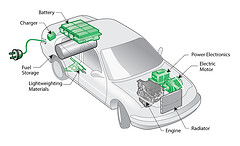The Pros and Cons of Owning an Environmentally Friendly Car
Despite an overall slump in the automotive industry, hybrid sales are growing steadily, with diesel sales not far behind. In the United States, new hybrid registrations jumped up at a rate of 34% between 2010 and the end of the 2012, with diesel sales up 24%. In Australia, hybrid sales went up a whopping 160% over the course of 2012, with a spike of 600% in December alone. After weak sales for the past decade, it appears as though consumers are turning to environmentally friendly cars en masse. This could be due to rising fuel prices across the globe, as well as an improvement in hybrid car technology. To find out whether an eco-car is right for your family, it’s helpful to take a closer look at the pros and cons of today’s models.
Advantages of Hybrids
To begin with, one of the major pros of purchasing a hybrid car is that it provides a cleaner vehicle. You’ll pay less at the pump thanks to the better gas mileage, and the car emits fewer carbon emissions at the same time. Despite having the power of a regular engine, the car helps conserve energy. This is also partially due to advances in technology. While the first generation of hybrids were clunky and lacked many basic amenities, if you look at a current car comparison between green-friendly and traditional vehicles you’ll find that the newest hybrids provide stiff competition. They come equipped with features like regenerative braking, which helps recharge the battery every time you brake. As a result, today’s cars can go longer between charges and have a wider range.
There are also outside incentives to owning an environmentally friendly car. You may qualify for tax benefits or government rebates depending on your location. Some businesses provide free parking or other incentives to employees driving green cars, and insurance rates tend to be lower for hybrids. With the demand for clean, green cars on the rise, you can expect their resale values to stay high. When compared to the depreciation of a traditional car, eco-friendly electric or hybrid models come out on top.
Disadvantages of Hybrids
Yet hybrids are not right for everyone. Although they are safe and reliable, hybrids are not necessarily the most exciting cars to drive, compare a hybrid to driving a new Audi A4 – find the Audi A4 review here. They have a lower power output, and generally don’t handle as well as conventional vehicles. Due to their light weight and small engine, hybrids are designed to boost economy rather than speed.
In an economic sense, you will also pay more up front for an environmentally friendly car like a hybrid. Even with tax breaks and rebates, the sticker price of a hybrid is usually considerably higher than a comparable conventional car. The difference between two models of the same brand may be as much as $10,000 greater for the hybrid. If you plan on driving it for longer than five years, you’ll recoup this difference by saving on fuel and insurance costs. Yet if you’re looking for a shorter term car, the extra cost may not be worth it. Hybrids also tend to cost more to repair due to the specific complexity of their systems, and not all mechanics are equipped to service them.
For those looking for a safe, reliable family car with low running costs, a hybrid can be a great option. Yet if you’re in the market for a sports car or prefer to change cars often, this may not be the best choice for you.
Image: Plug-in hybrid electric vehicle (PHEV) diagram (Photo credit: Argonne National Laboratory)

U also should point out that may hybrid cars have wifi devices built into the car so u will also be exposed to wifi everytime u drive.